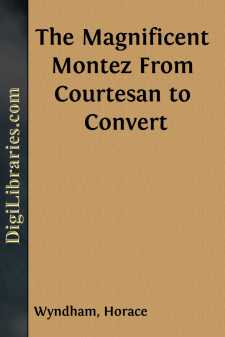Categories
- Antiques & Collectibles 13
- Architecture 36
- Art 48
- Bibles 22
- Biography & Autobiography 813
- Body, Mind & Spirit 142
- Business & Economics 28
- Children's Books 17
- Children's Fiction 14
- Computers 4
- Cooking 94
- Crafts & Hobbies 4
- Drama 346
- Education 46
- Family & Relationships 57
- Fiction 11829
- Games 19
- Gardening 17
- Health & Fitness 34
- History 1377
- House & Home 1
- Humor 147
- Juvenile Fiction 1873
- Juvenile Nonfiction 202
- Language Arts & Disciplines 88
- Law 16
- Literary Collections 686
- Literary Criticism 179
- Mathematics 13
- Medical 41
- Music 40
- Nature 179
- Non-Classifiable 1768
- Performing Arts 7
- Periodicals 1453
- Philosophy 64
- Photography 2
- Poetry 896
- Political Science 203
- Psychology 42
- Reference 154
- Religion 513
- Science 126
- Self-Help 84
- Social Science 81
- Sports & Recreation 34
- Study Aids 3
- Technology & Engineering 59
- Transportation 23
- Travel 463
- True Crime 29
The Magnificent Montez From Courtesan to Convert
by: Horace Wyndham
Categories:
Description:
Excerpt
FOREWORD
Sweep a drag-net across the pages of contemporary drama, and it is unquestionable that in her heyday no name on the list stood out, in respect of adventure and romance, with greater prominence than did that of Lola Montez. Everything she did (or was credited with doing) filled columns upon columns in the press of Europe and America; and, from first to last, she was as much "news" as any Hollywood heroine of our own time. Yet, although she made history in two hemispheres, it has proved extremely difficult to discover and unravel the real facts of her glamorous career. This is because round few (if any) women has been built up such a honeycomb of fable and fantasy and imagination as has been built up round this one.
Even where the basic points are concerned there is disagreement. Thus, according to various chroniclers, the Sultan of Turkey, an "Indian Rajah" (unspecified), Lord Byron, the King of the Cannibal Islands, and a "wealthy merchant," each figure as her father, with a "beautiful Creole," a "Scotch washerwoman," and a "Dublin actress" for her mother; and Calcutta, Geneva, Limerick, Montrose, and Seville—and a dozen other cities scattered about the world—for her birthplace. This sort of thing is—to say the least of it—confusing.
But Lola Montez was something of an anachronism, and had as lofty a disregard for convention as had the ladies thronging the Court of Merlin. Nor, it must be admitted, was she herself any pronounced stickler for exactitude. Thus, she lopped half a dozen years off her age, allotted her father (whom she dubbed a "Spanish officer of distinction") a couple of brevet steps in rank, and insisted on an ancestry to which she was never entitled.
Still, if Lola Montez deceived the public about herself, others have deceived the public about Lola Montez. Thus, in one of his books, George Augustus Sala solemnly announced that she was a sister of Adah Isaacs Menken; and a more modern writer, unable to distinguish between Ludwig I and his grandson Ludwig II, tells us that she was "intimate with the mad King of Bavaria." To anybody (and there still are such people) who accepts the printed word as gospel, slips of this sort destroy faith.
As a fount of information on the subject, the Autobiography (alleged) of Lola Montez, first published in 1859, is worthless. The bulk of it was written for her by a clerical "ghost" in America, the Rev. Chauncey Burr, and merely serves up a tissue of picturesque and easily disproved falsehoods. A number of these, by the way, together with some additional embroideries, are set out at greater length in other volumes by Ferdinand Bac (who confounds Ludwig I with Maximilian II) and the equally unreliable Eugène de Mirecourt and Auguste Papon. German writers, on the other hand, have, if apt to be long-winded, at least avoided the more obvious pitfalls. Among the books and pamphlets (many of them anonymous) of Teutonic origin, the following will repay research: Die Gräfin Landsfeld (Gustav Bernhard); Lola Montez, Gräfin von Landsfeld (Johann Deschler); Lola Montez und andere Novellen (Rudolf Ziegler); Lola Montez und die Jesuiten (Dr. Paul Erdmann); Die spanische Tänzerin und die deutsche Freiheit (J. Beneden); Die Deutsche Revolution, 1848-1849 (Hans Blum); Ein vormarzliches Tanzidyll (Eduard Fuchs); Abenteur der beruhmten Tänzerin; Anfang und Ende der Lola Montez in Bayern; Die Munchener Vergange; Unter den vier ersten Königen Bayerns (Luise von Kobell); and, in particular, the monumental Histeriche of Heinrich von Treitschke. But one has to milk a hundred cows to get even a pint of Lola Montez cream.
With a view to gathering at first hand reliable and hitherto unrecorded details, visits have recently been made by myself to Berlin, Brussels, Dresden, Leningrad, Munich, Paris, and Warsaw, etc., in each of which capitals some portion of colourful drama of Lola Montez was unfolded. In a number of directions, however, the result of such investigations proved disappointing.
"Lola Montez—h'm—what sort of man was he?" was the response of a prominent actor, recommended to me as a "leading authority on anything to do with the stage"; and the secretary of a theatrical club, anxious to be of help, wrote: "Sorry, but none of our members have any personal reminiscences of the lady." As she had then been in her grave for more than seventy years, it did not occur to me that even the senior jeune premier among them would have retained any very vivid recollections of her. Still, many of them were quite old enough to have heard something of her from their predecessors....


